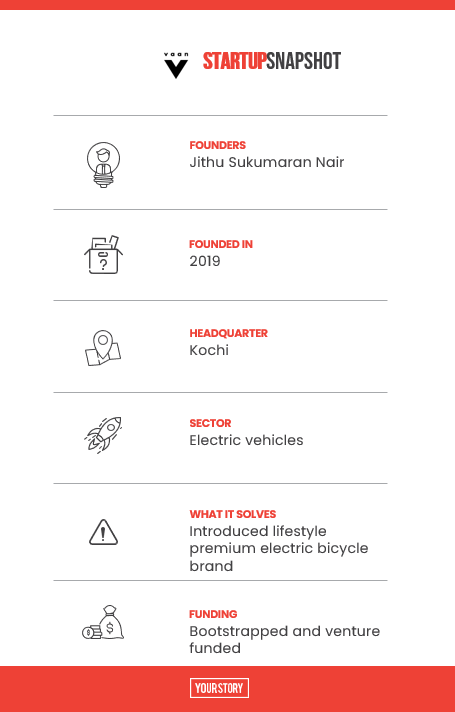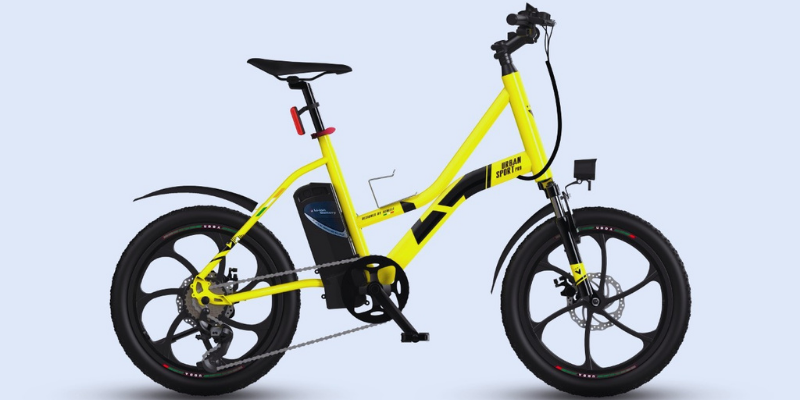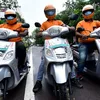As a marine engineer, Jithu Sukumaran Nair visited several countries. It was during his stay in Shenzen, China, Jithu got a first-hand feel of the electric vehicles (EV) industry and decided to venture into this segment.
“I wanted to develop electric vehicles and do this in India,” the Kochi born entrepreneur says.
This was the genesis of VAAN Electric Moto — a Kochi-based electric bike manufacturing startup. At present, VAAN Moto has a team of 22 members.
Jithu did not take the easy route of importing EVs. Rather, in 2017, he undertook a deep market study to understand the consumer perception of EVs across four cities — Ahmedabad, Mumbai, Bengaluru, and Pune.
“During that time, people were not ready and unsure about purchasing an electric vehicle, but much has changed since then for the better,” he tells YourStory.

The beginning
VAAN Moto — formally registered as a startup in March 2019 — decided to focus on premium lifecycle electric bicycles, apparel, and accessories.
To help with his venture, VAAN Moto partnered with leading players in this segment, including Benelli of Italy and Kiska of KTM from Austria. While VAAN Moto designs these electric bicycles, Benelli supplies components, and Kiska helps with the branding.
And, VAAN Moto was in no hurry to introduce its model in the market. “We spent more than a year just on the engineering,” says Jithu.
VAAN Moto has two e-bike models that feature a unisex compact frame, 20-inch wheels, detachable batteries, indicator lighting, etc. These bikes can operate in three modes — normal pedalling, pedal-assist mode, and throttle mode.
In the throttle mode, the bike can accelerate to a maximum speed of 25 km per hour, it claims. “To develop a smaller bike with sophisticated engineering is much more difficult than the regular ones. Our frame is very different,” Jithu explains.

The Urbansport Pro model of VAAN Moto
Earlier in January, the Kochi-based startup launched its two models, priced at Rs 60,000 and Rs 70,000, respectively, targeting users in the age group of 18-35 years. Nonetheless, it has found takers beyond this age group.
At present, these EVs are available in Kerala. VAAN Moto has also received enquiries from Tamil Nadu, Karnataka, Goa, and Maharashtra to launch its vehicles in these states.
“We introduced these bikes first in Kerala because we want to be closer to the customer and immediately solve for any teething issues they would have,” says Jithu.
To date, VAAN Moto has sold 35 electric bicycles, and it aims to sell around 750-1,000 units a month, including outside of Kerala.
Future plans
As far as its immediate plan goes, VAAN Moto is looking at manufacturing an electric moped and is working on a hybrid electric boat. It aims to build these EVs in India instead of largely depending on imported components.
Bootstrapped since inception, VAAN Moto recently raised Rs 6 crore in a pre-Series A funding round from Asian Energy Services. It plans to raise another funding round to set up its battery swapping infrastructure.
In the electric bicycle segment, the startup competes with Hero Cycles, GoZero Mobility, Trek Sizes, etc.
The market opportunity in India for the electric bicycle segment is still small. According to Mordor Intelligence, “Besides increasing customer preference towards electric bikes for recreational and adventure activities, the adoption of e-bikes in several other sectors, such as logistics and rentals, is driving the market growth of electric bikes in India.”
It added, “A large population of the country, along with raising last-mile logistics is expected to provide the e-bike market with an opportunity to grow during the forecasted period.”
Talking about what sets VAAN Moto apart from its competitors, Jithus says, “We have taken a lot of time to build the product and the brand, as our product is very different in terms of power, style, and finishing.”
Setting up the company in Kochi made more sense to the founder as the state government is actively promoting the startup ecosystem.
For the chief project consultant with Hindustan Shipyard Limited, Jithu says the electric vehicles segment was unfamiliar territory. “Building ships is totally different from electric vehicles, but we keep on learning,” he adds.
Edited by Suman Singh


